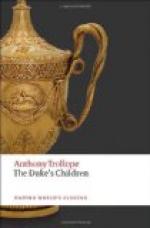’Did they not do so they would neglect a manifest duty. Nothing is more essential to the political well-being of the country than that the leaders on both sides in politics should be prepared for their duties. But for myself, I am bound at last to put in the old plea with a determination that it shall be respected. “Solve senescentem.” It is now, if I calculate rightly, exactly fifty years since I first entered public life in obedience to the advice of Lord Grey. I had then already sat five years in the House of Commons. I had assisted humbly in the emancipation of the Roman Catholics, and have learned by the legislative troubles of just half a century that those whom we then invited to sit with us in Parliament have been in all things our worst enemies. But what then? had we benefited only those who love us, would not the sinners also,—or even the Tories,—have done as much as that?
’But such memories are of no avail now. I write to say that after so much of active political life, I will at last retire. My friends when they see me inspecting a pigsty or picking a peach are apt to remind me that I can still stand on my legs, and with more of compliment than of kindness will argue therefore that I ought still to undertake active duties in Parliament. I can select my own hours for pigs and peaches, and should I, through the dotage of age, make mistakes as to the breeding of one or the flavour of the other, the harm done will not go far. In politics I have done my work. What you and others in the arena do will interest me more than all other things in this world, I think and hope, to my dying day. But I will not trouble the workers with the querulousness of old age.
’So much for myself. And let me, as I go, say a parting word to him with whom in politics I have been for many years more in accord than with any other leading man. As nothing but age or infirmity would to my own mind have justified me in retiring, so do I think that you, who can plead neither age nor infirmity, will find yourself at last to want self-justification, if you permit yourself to be driven from the task either by pride or indifference.
’I should express my feelings better if were I to say by pride and diffidence. I look to our friendship, to the authority given me by my age, and to the thorough goodness of your heart for pardon in thus accusing you. That little men should have ventured to ill-use you, has hurt your pride. That these little men should have been able to do so has created your diffidence. Put you to a piece of work that a man may do, you have less false pride as to the way in which you may do it than any man I have known; and, let the way be open to you, as little diffidence as any. But in this political mill of ours in England, a man cannot always find the way open to do things. It does not often happen that an English statesman can go in and make a great score off his own bat. But not the less is he bound to play the game and to go to the wicket when he finds that his time has come.




